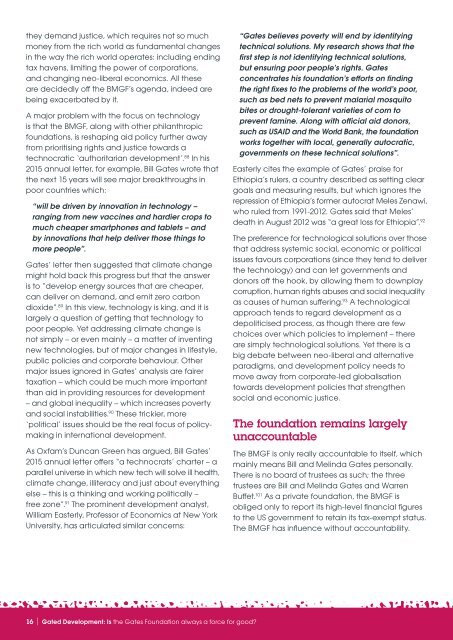Gated Development
gated_development_final_version
gated_development_final_version
Create successful ePaper yourself
Turn your PDF publications into a flip-book with our unique Google optimized e-Paper software.
they demand justice, which requires not so much<br />
money from the rich world as fundamental changes<br />
in the way the rich world operates: including ending<br />
tax havens, limiting the power of corporations,<br />
and changing neo-liberal economics. All these<br />
are decidedly off the BMGF’s agenda, indeed are<br />
being exacerbated by it.<br />
A major problem with the focus on technology<br />
is that the BMGF, along with other philanthropic<br />
foundations, is reshaping aid policy further away<br />
from prioritising rights and justice towards a<br />
technocratic ‘authoritarian development’. 88 In his<br />
2015 annual letter, for example, Bill Gates wrote that<br />
the next 15 years will see major breakthroughs in<br />
poor countries which:<br />
“will be driven by innovation in technology –<br />
ranging from new vaccines and hardier crops to<br />
much cheaper smartphones and tablets – and<br />
by innovations that help deliver those things to<br />
more people”.<br />
Gates’ letter then suggested that climate change<br />
might hold back this progress but that the answer<br />
is to “develop energy sources that are cheaper,<br />
can deliver on demand, and emit zero carbon<br />
dioxide”. 89 In this view, technology is king, and it is<br />
largely a question of getting that technology to<br />
poor people. Yet addressing climate change is<br />
not simply – or even mainly – a matter of inventing<br />
new technologies, but of major changes in lifestyle,<br />
public policies and corporate behaviour. Other<br />
major issues ignored in Gates’ analysis are fairer<br />
taxation – which could be much more important<br />
than aid in providing resources for development<br />
– and global inequality – which increases poverty<br />
and social instabilities. 90 These trickier, more<br />
‘political’ issues should be the real focus of policymaking<br />
in international development.<br />
As Oxfam’s Duncan Green has argued, Bill Gates’<br />
2015 annual letter offers “a technocrats’ charter – a<br />
parallel universe in which new tech will solve ill health,<br />
climate change, illiteracy and just about everything<br />
else – this is a thinking and working politically –<br />
free zone”. 91 The prominent development analyst,<br />
William Easterly, Professor of Economics at New York<br />
University, has articulated similar concerns:<br />
“Gates believes poverty will end by identifying<br />
technical solutions. My research shows that the<br />
first step is not identifying technical solutions,<br />
but ensuring poor people’s rights. Gates<br />
concentrates his foundation’s efforts on finding<br />
the right fixes to the problems of the world’s poor,<br />
such as bed nets to prevent malarial mosquito<br />
bites or drought-tolerant varieties of corn to<br />
prevent famine. Along with official aid donors,<br />
such as USAID and the World Bank, the foundation<br />
works together with local, generally autocratic,<br />
governments on these technical solutions”.<br />
Easterly cites the example of Gates’ praise for<br />
Ethiopia’s rulers, a country described as setting clear<br />
goals and measuring results, but which ignores the<br />
repression of Ethiopia’s former autocrat Meles Zenawi,<br />
who ruled from 1991-2012. Gates said that Meles’<br />
death in August 2012 was “a great loss for Ethiopia”. 92<br />
The preference for technological solutions over those<br />
that address systemic social, economic or political<br />
issues favours corporations (since they tend to deliver<br />
the technology) and can let governments and<br />
donors off the hook, by allowing them to downplay<br />
corruption, human rights abuses and social inequality<br />
as causes of human suffering. 93 A technological<br />
approach tends to regard development as a<br />
depoliticised process, as though there are few<br />
choices over which policies to implement – there<br />
are simply technological solutions. Yet there is a<br />
big debate between neo-liberal and alternative<br />
paradigms, and development policy needs to<br />
move away from corporate-led globalisation<br />
towards development policies that strengthen<br />
social and economic justice.<br />
The foundation remains largely<br />
unaccountable<br />
The BMGF is only really accountable to itself, which<br />
mainly means Bill and Melinda Gates personally.<br />
There is no board of trustees as such; the three<br />
trustees are Bill and Melinda Gates and Warren<br />
Buffet. 101 As a private foundation, the BMGF is<br />
obliged only to report its high-level financial figures<br />
to the US government to retain its tax-exempt status.<br />
The BMGF has influence without accountability.<br />
16 I <strong>Gated</strong> <strong>Development</strong>: Is the Gates Foundation always a force for good?


